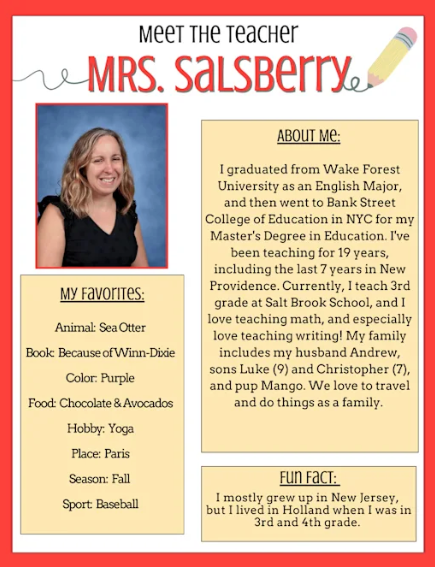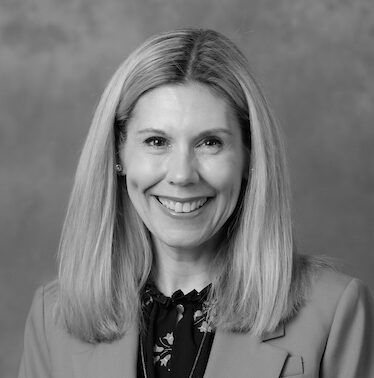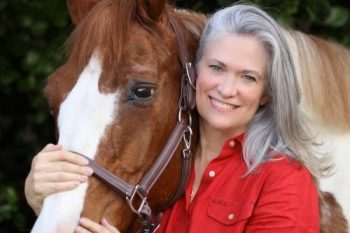Not only is Monday the “first day of class” at Wake Forest, it’s also the “first day in the classroom” for third-grade teacher Kristin Salsberry (’99), the 2025 Teacher of the Year at Salt Brook School in New Providence, N.J.
At Wake Forest, Salsberry majored in English and minored in dance and French. Upon graduation, she returned to New Jersey and worked through AmeriCorps with after-school and adult literacy programs, figuring out how to teach children and grown-ups how to read.
That experience inspired her to earn a master’s degree at Bank Street College of Education in 2006 and teach in New York City before returning to New Jersey. Now she’s been teaching for two decades, is married to a teacher and has two sons of her own.
Earlier this year, when Salsberry was recognized as her school’s teacher of the year, her principal, Jean Drexinger, encouraged students to share a poem they wrote in her honor. A local news website quoted Drexinger as saying: “Through their words, you will hear how Ms. Salsberry makes learning fun, how she turns challenges into opportunities, and how her kindness leaves a lasting impact on each student. From imagining her as a superhero to sharing their favorite classroom memories, her students paint a vivid picture of a teacher who not only teaches lessons but also touches lives.”
Kelly Greene (’91), managing editor of Wake Forest Magazine, caught up with Salsberry in the waning days of summer to hear her thoughts heading into the new school year. Here are edited excerpts from their conversation.

Kelly Greene: How did you make the decision to be a teacher?
Kristin Salsberry: The AmeriCorps experience had a really big impact on me. I worked in Paterson. It was a very underserved community, and it made me want to make a difference. They put a lot of college grads in there, and we didn’t get a lot of training, and I didn’t have an education background. So we had to be really creative and kind of make our own program without a lot of guidance. But I just loved it. Even after I left, I wrote letters to the students. Connecting with those kids was what inspired me to become a teacher. It made me want to be able to reach many different kids.
KG: What do you think you take from Wake Forest into the classroom with you?
KS: I feel like maybe Pro Humanitate, the motto of just thinking about other people and doing for others, that’s something that I took with me. And I feel like being an English major helped me analyze people and literature. And now I love teaching reading. I love teaching writing.

KG: What are your rituals? What do you look forward to when you go back to school?
KS: Setting up my classroom and thinking about what are the activities that I want to do to build community. At the beginning of the year, I pull out all my favorite books and especially all my favorite picture books. I do a lot of read-alouds in the beginning of the year, just thinking about how I’m going to use those to not only build community, but also just start to have discussions with kids about routines and rules and things like that. It’s a weird thing. You have to pack up your classroom and finish your year, and then the unpacking of the classroom and setting it all up is me getting my brain ready for my new students. And we have our class lists now, so I can go in and start getting ready for all the kids that I have.
KG: What are your favorite picture books that you pull out the first week?
KS: Ooh, that’s a good question. I love two by Jacqueline Woodson. One is called “Each Kindness” and the other is called “The Day You Begin.” Those are two of my favorites. I love “We Don’t Eat Our Classmates,” because that is just funny.
I also love Patricia Polacco’s “Thank you, Mr. Falker,” because it’s about the author, who had dyslexia. It’s so powerful. The author herself had a hard time in school. She had a hard time learning to read and learning to write and kind of faked it for a long time until she got to fifth grade and her teacher, Mr. Falker, realized it. And he did all this multisensory stuff and got her the help she needed, and now she’s a picture-book author. That’s one of my very favorites to read.

KG: What do you want parents of your students to know?
KS: Teachers are your partner in your child’s education. And I really, truly believe that, as a parent, you know your kids best. I always do a little survey every year: Tell me anything about your child, like home life, learning style. What are the things that are going to help me help your child learn best? And I value that parent input and that constant communication because I think it’s so important to helping kids get the best out of their school year.
KG: What is your hope for your students this year?
KS: Third grade is just such a great year. In second grade, you’re still learning to read. In third grade, you’re reading to learn. So there’s that piece, but I really feel like third grade is a year where kids bloom in terms of their writing. They come in and they’re writing maybe four to five sentences, and by the end, they’re writing four to five paragraphs. So I always look forward to inspiring students to become better writers and helping them on their way.
I think in math, I am looking forward to teaching them how to have conversations about math and think about numbers. Third grade’s such a big year, it’s just like a bridge from lower to upper elementary. So I feel like kids really become students.
KG: You’ve been teaching for 20 years. That’s so impressive. How do you keep going?
KS: Good rest in the summer, getting to travel a little bit with my family. This year, we went to Arizona. I feel like hitting the reset button hard helps.



